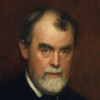“ A man who thinks for himself knows what others do not, but does not know what others know. ”
Samuel Butler, The Note-Books of Samuel Butler (1912). copy citation
| Author | Samuel Butler |
|---|---|
| Source | The Note-Books of Samuel Butler |
| Topic | thought |
| Date | 1912 |
| Language | English |
| Reference | |
| Note | |
| Weblink | http://www.gutenberg.org/files/6173/6173-h/6173-h.htm |
Context
“So here again the same old paradox and contradiction in terms meets us, like a stone wall, in the fact that we love best those who are in the main like ourselves, but when they get too like, we hate them, and, at the same time, we hate most those who are unlike ourselves, but if they become unlike enough, we may often be very fond of them.
Genius must make those that have it think apart, and to think apart is to take one’s view of things instead of being, like Poins, a blessed fellow to think as every man thinks. A man who thinks for himself knows what others do not, but does not know what others know. Hence the belli causa, for he cannot serve two masters, the God of his own inward light and the Mammon of common sense, at one and the same time. How can a man think apart and not apart? But if he is a genius this is the riddle he must solve.”
source



